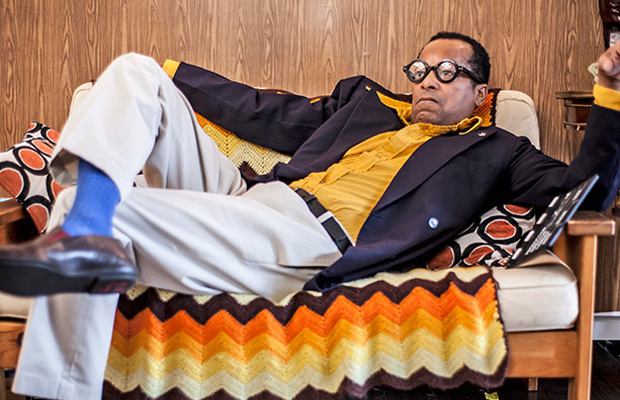Holliday Heart: Winter Reimagines the Peripheral Flotsam and Jetsam of Famed Interview
On December 3, 1966, filmmaker Shirley Clarke (Sarah Schulman) invites gay street hustler Jason Holliday (Jack Waters) to the Chelsea Hotel as her documentary subject. The twelve hour interview, which was partially administered by Clarke’s colleague, actor Carl Lee (Orran Farmer), finds Holliday initially ‘acting’ for the camera, boasting of his significant accomplishments and lofty future plans. But as hours fly by and drugs and alcohol are heavily consumed, Holliday begins to exhibit significant emotional strain, which is exactly how Clarke seems to want to capture him.
Much like the evolution that transpires in the adaptation of a literary work to the visual medium, a similar instance of interpretation transpires in jumping between cinematic formats. Jason and Shirley actually feels like its own documentary, an incredibly self-contained venture enhanced by a bit of esoteric cultural significance. In many ways, this a similar move to something like the 2009 narrative rehash of the famed Maysles’ doc Grey Gardens, except Winter’s film is more along the lines of reenacting a behind-the-scenes featurette.
Too often, Jason and Shirley is hobbled by inauthenticity, in the form of stilted dialogue, wooden or forced performance, and uncomfortable comparisons to the figures from the actual documentary. Holliday, though played with an admirable energy from Jack Waters, comes across as a nothing more than a formidably irritating cliché while Schulman’s Clarke is merely a world wearied manipulator. At the moment she pulls Orran Farmer’s Carl Lee aside to direct him to “break” Holliday so she can capture the right tone of self-loathing on film, it feels not only corny but falsely verbalized. More than a recuperation of Clarke and Holliday, this instead feels like a paltry adaptation of James Baldwin.
Winter, whose last feature was his little seen 1997 directorial debut Chocolate Babies (a comedy/drama which featured a memorable turn from Dudley Findlay Jr. as an HIV positive drag queen), manages to create another avenue of discussion in regards to Clarke’s original documentary. The end credits point out that her film is the only critically celebrated cinematic endeavor featuring a gay black male. It’s a sobering realization, since outside the critical canon, there are other examples one can certainly point to, but many do not project outside the reverie of niche or cult audiences. Jason and Shirley may not manage to right that slight, but it’s all the more relevant for calling attention to the continued notable absence of queer characters of color in the realm of either the culturally celebrated or notably iconic.
★★½/☆☆☆☆☆
